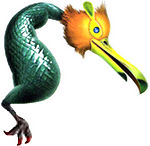Snavian family: Difference between revisions
(Adding categories) |
(Adding categories) |
||
| Line 18: | Line 18: | ||
[[Category:Pikmin 2]] | [[Category:Pikmin 2]] | ||
[[Category:Bosses]] | [[Category:Bosses]] | ||
[[Category:Pikmin (game)]] | |||
[[Category:Pikmin (franchise)]] | |||
Revision as of 02:56, April 28, 2012
Snavians are a family of serpentine bird creatures that bury themselves. They are found in both Pikmin games, often constituting boss fights. In Pikmin, only Burrowing Snagrets appear, in The Forest of Hope and in Challenge Mode. In Pikmin 2, they appear in greater numbers and variety, particularly in the Snagret Hole. "Snavian" is a portmanteau of "snake" and "avian" (avian meaning bird).
Burrowing Snarrow
A creature mentioned by Olimar in Pikmin and Pikmin 2. This creature has not been seen in-game yet. It was recorded by Olimar to look almost exactly like a Burrowing Snagret, however it can be told apart by wing and tail markings when the two are pulled from the ground. It was seen in the beta trailer of Pikmin.
Burrowing Snagret
- Main article: Burrowing Snagret.
The Burrowing Snagret is an enemy in the Pikmin games that hides underground, waiting to burst out when Pikmin approach. They are able to quickly snap up Pikmin on the ground with their beaks. Although the Snagret's whole body is vulnerable, it sustains most damage when its head is attacked. When killed, they explode, yielding many pellets. In Pikmin 2, the Burrowing Snagrets' heads remain, and they are smaller and have lower health, making them less of a threat.
Pileated Snagret
- Main article: Pileated Snagret.
The Pileated Snagret is a larger, rarer, and more dangerous species of the Snavian family. It has a green, scaly body, and a bright orange head. It is called 'pileated' because it has a crest of feathers on its head, and its eyes are decorated by some eyebrow-like features. The Pileated Snagret behaves much like the Burrowing Snagret, but it is able to completely emerge from the ground and hop around on one clawed foot. This means it can chase its prey, and makes its head harder to reach.
